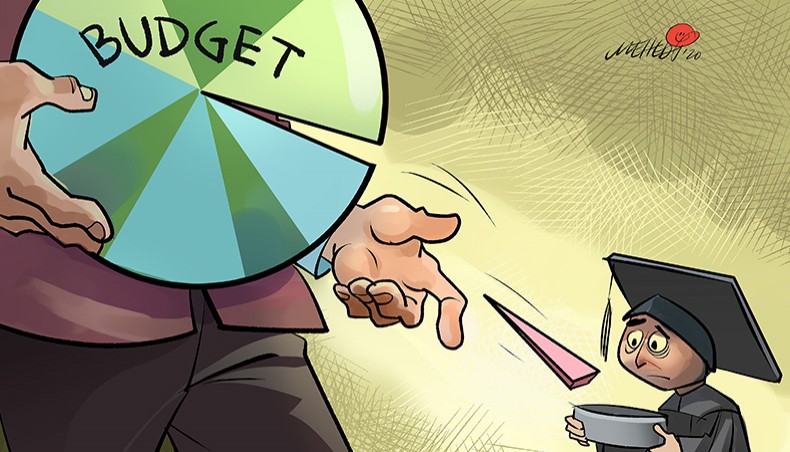The recent decision by the federal government to drastically cut the Higher Education Commission's (HEC) budget has thrown Pakistan’s higher education sector into chaos. It is a perplexing move for a nation that depends on its youth to lead it towards a prosperous future, yet undercuts the very budget that fuels their education.
As of the new fiscal year, the HEC's recurrent budget has been slashed from Rs65 billion to a mere Rs25 billion. The sudden disappearance of Rs40 billion has not only sparked outrage and confusion but also highlighted a glaring disconnect between the government’s stated priorities and the actual needs of the educational sector. This financial blow affects over 160 public universities in Pakistan, which had collectively requested Rs126 billion to meet their operational and developmental needs.
The developmental budget from the Planning Commission has also been severely reduced from Rs59 billion to Rs21 billion. This financial strangulation has prompted emergency meetings among vice chancellors, who unanimously agree that these budget cuts are catastrophic for higher education in Pakistan.
Budget cuts and universities
HEC Chairman Dr. Mukhtar Ahmed confirmed receiving the official notification from the Ministry of Finance and the Planning Commission. His concern is well-founded. Federal universities are now expected to stretch a budget that barely covers basic operational costs, let alone supports ambitious research projects or maintains academic standards. The situation is further exacerbated by the HEC's inability to fund provincial universities, leaving them to fend for themselves in an already dire financial climate.
The lack of response from significant political parties on this issue is telling. It suggests that higher education has never been a priority, despite the fact that 60% of Pakistan’s population is under the age of 30. Neglecting education for this demographic is not only shortsighted but also detrimental to the nation's future.
System in crisis
A colleague from Quaid-i-Azam University (QAU) aptly described the situation as education being “in the emergency room” for quite some time. The government's lackadaisical attitude towards higher education indicates a deeper systemic apathy. This raises a critical question: where exactly is the nation headed when its youth, brimming with potential, are deprived of educational support?
Financial mismanagement within universities is also a significant issue. Universities are not only victims of external budget cuts but also of internal inefficiencies. There are frequent allegations of funds being misappropriated or diverted. If universities are to plead for more funds, they must also demonstrate financial responsibility and transparency.
Consider the stark reality: Rs25 billion for 24 federal universities. This amount is insufficient to cover even the basic salaries, let alone other operational costs. Among these institutions are major universities like QAU, NUST, PIEAS, NDU, and Bahria University, each with substantial financial needs. The current budget allocation is akin to asking an elephant to subsist on crumbs.
During discussions at QAU, one professor emphasized that federal universities need not just increased budgets but also foolproof management of those funds. A dual approach of seeking increased financial support while ensuring meticulous budget management is crucial. This is not rocket science, yet it seems to elude many in positions of power.
Provincial discrepancies
Interestingly, the Sindh government has consistently allocated reasonable funds for higher education. In contrast, Khyber Pakhtunkhwa (K-P) allocated only marginal funds for universities in the 2024 budget. This discrepancy highlights the uneven priorities and capacities of provincial governments. Ultimately, the federal government will bear the brunt of these budget cuts, potentially affecting the funding shares of even federal universities.
A professor summarized it well: vague political decisions invariably end up costing the public, exacerbating the politics of divide and rule. The inconsistency in funding across provinces is not just a financial issue; it’s a political one, underscoring a fragmented approach to education in Pakistan.
It is no surprise that institutions of higher learning are struggling to contribute meaningfully to the national economy. The government needs to not only increase the higher education budget but also develop a long-term, concrete plan. While Pakistani universities have been improving their quantitative rankings, their impact on educational or economic policies remains negligible.
Call for action
As the country grapples with these budget cuts, it is time for a reality check. Financial mismanagement within universities needs addressing, but so does the government's role in ensuring adequate funding. The political landscape must shift to genuinely prioritize education. Universities, in turn, must prove their worth not just in numbers but in their tangible impact on society and the economy.
Higher education in Pakistan is at a critical juncture. The nation can either let it wither under financial constraints and mismanagement or take bold steps to ensure it thrives. The youth of this nation deserve better, and it is our collective responsibility to fight for a robust, well-funded educational system that can propel Pakistan into a brighter future.
The severe budget cuts to Pakistan’s higher education sector are more than just numbers on a ledger; they represent a significant threat to the nation’s future. Immediate and coordinated action is required from both the government and educational institutions to address this crisis. By increasing funding and ensuring efficient use of resources, Pakistan can provide its youth with the education they need to lead the country towards prosperity. It is not just an investment in education; it is an investment in the future of Pakistan.



























